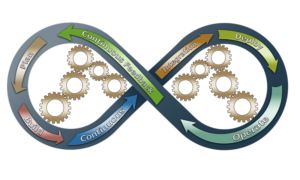Before choosing an appropriate outsourcing option for your software development project, it is necessary to have a formal evaluation process. This entails a comprehensive background check of the outsourcing partner, a closer examination of their development standards and security guidelines, a talent pool skills assessment, and finalizing the budgeting details. But let’s first get into the details of DevOps outsourcing and examine all crucial factors.
DevOps outsourcing is also known as DevOps as a Service (DaaS) is when third-party service providers are in charge of all the responsibilities of creating, integrating, and maintaining DevOps solutions for your business. The outsourcing partner provides a top-tier team of Azure DevOps engineers who collaborate with the internal software team to oversee all the operational tasks related to DevOps.
Top 6 Factors To Consider When Evaluating DevOps Outsourcing partner
DevOps outsourcing may seem an easy task, but there are certain things you need to consider before making the final decision. DevOps cover a wide array of services; therefore, there is no solution to work for all business requirements. A step-by-step guide for starting the DevOps procedures, picking the best partner, and making it successful via effective DevOps outsourcing.
1. Define The Main Business Objectives For DevOps
Businesses working on outsourcing DevOps engineers need to highlight all the critical areas of improvement by agile and DevOps practices. As a business leader, you can start by outlining the objectives and issues DevOps will help you achieve. Identifying crucial areas for improvement can also help you choose the best DevOps outsourcing option to fulfil your business’s unique KPIs, such as scalability, cost audit, 24/7 support, migration, big data, or data analytics.
The major areas of improvement are the following:
Scalability: The cloud environment needs the immediate attention of the DevOps engineers to support continuous development procedures.
24/7 Assistance: Through the best practice of automating all the processes, engineers will be able to concentrate fully on their work.
Cost Analysis: By selecting the cloud-based services and solutions that are tailored to your business use cases, DevOps engineers assist in reducing the cost.
Migration: The best DevOps practices lessen the burden of cloud migration. While migrating the workload from a traditional data center to the cloud, DevOps account for almost 30% of the work needed.
In essence, there is a dire need to set clear expectations to prevent any inconvenience in the future and be transparent in your deadlines, and deliverables to ensure everyone is on the same page.
2. Assess The Governance Framework
DevOps is an agile practice that depends largely on collaboration. As a result, a governance architecture that defines the important market players, processes, and technologies is required. Business owners are familiar with user personas, end goals, and the finished product of applications. The targeted operating model (TOM) assists in reducing differences and creating teams within a single mindset for a successful partnership.
This model creates a governance framework with interrelated components such as roles and responsibilities, reviews, organizational structure, people, processes, and tooling for top-notch outcomes.
For better DevOps outsourcing results, you may also pick the best governance components and include them into the model. The following are the factors to take into account to reduce risks:
Legal matters: DevOps outsourcing vendors with special certifications, or they won’t be able to serve specific environments due to potential legal restrictions on the third party’s access.
Architecture design and mission: Creating a roadmap for the DevOps plan to implement a high-level architectural vision is integral to the process. Choosing a platform (AWS, Azure, or GCP) is a commitment with requirements.
Integration: The in-depth knowledge to transfer and integrate open-source tools is necessary to complete the DevOps processes successfully.
3.Evaluate The Tech Expertise Of DevOps Outsourcing Partner
The right outsourcing partner is the most important factor in deciding the DevOps services you want to opt for your business. Organizations must conduct complete research to choose a single outsourcing partner. Use the following checklist to investigate your possible outsourcing partners’ lists thoroughly.
Cloud
The option of public, private and hybrid cloud are familiar to the vendor you are choosing for DevOps outsourcing.
CI/CD
The knowledgeable tech partner is well –versed about setting up and all the essential tools of CI/CD pipelines. This will help your enterprise in the following ways:
- Boost the delivery of applications and services that are delivered to various businesses
- Reduced the lead time, which is the period between the initiation of project and its deployment
Containerization
Containers are the best way to create applications. It has replaced conventional virtual machines as the industry standard for computing infrastructure (VMs).This aids different enterprises in getting the following advantages:
- Allowing the DevOps engineers to focus on essential tasks
- By automating the data back-up, recovery of data becomes easy
- Improve the use of hardware
- Reduced IT expenses
- Maintain resource effectiveness
Infrastructure as Code (IaC)
A clear and new perspective on conventional resource management for computers is provided by infrastructure as code (IaC). To name a few, benefits of IaC includes:
- Better infrastructure management
- Proper documentation of all the records
- Infrastructure unification across different environments
DevSecOps
The primary goal is to monitor and secure the infrastructure and application through DevSecOps methodology. The following testing tools come under the domain of DevSecOps.
- Static Code Analysis
- Static Application Security Testing(SAST)
- Interactive Application Security Testing (IAST)
- Vulnerability Scanning
- Dynamic Application Security Testing (DAST)
- Software Composition Analysis (SCA)
Monitoring and Logging
Effective monitoring and logging will secure the data sets. Also, logging is a technique for monitoring and archiving data to evaluate the performance of datasets. By examining the key metrics, monitoring helps detect system-related problems in DevOps. The various monitoring options include:
- Application monitoring
- Network monitoring
- Infrastructure monitoring
Release Management
Release management is often a long term process of creating, testing and deploying and monitoring the software. Additionally, long-term strategic planning is also necessary for success. If done right by a reliable DevOps outsourcing partner, following are some of the main benefits of this:
- Parallel development is possible
- Enhances the productivity of developers
- Allows quick and easier release cycles
- Gives a clear-cut development path from the first changes to the production
4. Analyze Their Soft Skills
The secret to successful outsourcing and DevOps is the same: communication is a key component. You must ensure that your DevOps partner has a strong communication plan in place so that the internal team can help implement the entire plan.
You may gauge their abilities by speaking with them through various channels and noticing how professional they are.
5. Formalize The Outsourcing
After evaluating the necessary details about the DevOps outsourcing partner, it is time to finalize a contract with them. In order to make the appropriate choice, it is crucial to have a thorough understanding of DevOps outsourcing models.
Closed-source Outsourcing
This type of contract typically contains all functional and technical designs and essential services and tools. It is predicated on (more or less) unchanging circumstances and managed work practices.
Open-source Outsourcing
This type of contract usually involves thinking out of the box. Innovation, operations, and cultural practices are emphasized more. It considers a stream of production, distribution, and administration that complies with the continuously changing demands of the market and users.
The dynamic nature of software engineering is significantly gaining all the benefits by implementing the best DevOps practices. Additionally, T&M (Time and Material) contracts can be considered by your company as a possible replacement for fixed-price agreements.
Create a value-driven outsourcing contract with the vendor that outlines the DevOps roadmap and allows for flexibility and future modifications.
6. Performance Tracking
If you think finalizing the contract is the end of onboarding DevOps outsourcing, you need to reconsider certain elements. A successful DevOps outsourcing partner will also follow and understand the right metrics for gauging performance in your business.
The important measures of the performance metrics include measures like deployment frequency, lead time for modifications, mean time to recover, change failure rate.

How Effective Is DevOps Outsourcing For Your Company?
The DevOps services for the software development process work to speed up the software development lifecycle by emphasizing the culture and procedures that enable the software and operational team to work as a single unit.
Also, if done right and in a timely manner DevOps outsourcing can give businesses rapid access to highly qualified engineers who are knowledgeable about DevOps technologies and techniques without the hassle and expense of setting up in-house DevOps teams.
The outsourcing of DevOps services can be tailored to your project requirements. Every enterprise has its unique business requirements to meet, so each project calls for a customized DevOps strategy. By Hiring Azure DevOps resources, the scope of the project will be carefully evaluated, and a case-by-case agreement on the services will be reached. Here are some of the most effective ways to outsource a DevOps engineer.
End-To-End DevOps Services
The fully managed DevOps services are responsible for all the DevOps-related tasks using the best possible practices. The outsourcing service providers work together with your present on-site or remote staff to build, test, and deploy cloud-based infrastructure and applications in this scenario continuously and automatically.
In accordance with your corporate goals, the company also assists in implementing the most recent DevOps techniques and concepts into your business. The Azure CI/CD Pipeline engineers help your business develop a comprehensive plan from start to finish and even put the DevOps philosophy into practice to accommodate your existing infrastructure and user requirements.
DevOps Consulting Services
The DevOps professionals evaluate your current plan, provide meaningful insights and ways to enhance the current IT infrastructure, and assist with putting the required changes into place to reach your business objectives with the DevOps method.
Hiring top-notch consultants is crucial to reach your business’s end goal with leading DevOps consulting services.
DevOps Automation
With the essential technical skills, DevOps specialists can speed up the software development lifecycle (SLDC). You can outsource automation to a DevOps services provider for a trustworthy automated testing environment.
Dedicated Team Of DevOps Engineers
Last but not least, the service providers also offer the option to hire a dedicated team of DevOps engineers for a suitable duration for your ongoing projects.
Key Benefits Of DevOps Outsourcing
Access to high-level expertise and skills: DevOps outsourcing companies have expertise in specific technologies, methodologies, and tools for the effective software development process.
Increased efficiency and productivity: By giving teams access to open-source tools, technologies, and processes, DevOps outsourcing can aid in boosting the effectiveness and productivity of the software development process. Software design and deployment can be done in less time and with less effort..
Reduction in costs: By eliminating the need for internal personnel and resources, outsourcing the DevOps team can help businesses reduce costs. This covers expenses for recruiting, educating, and supervising employees and maintaining equipment and infrastructure.
Scalability and flexibility: Companies can scale their operations up or down as necessary by outsourcing DevOps. As a result, businesses can better adapt to fluctuations in demand and promptly hire dedicated individuals when needed.
Complete security and compliance: By giving teams access to the most recent security best practices and tools, outsourcing DevOps can improve the security and compliance of the software development process.
For more information about the pros and cons, refer to our blog: Discover the Benefits and Challenges of DevOps Outsourcing: A Practical Guide.
Kickstart Your DevOps Journey With Kloudeo
Choosing Kloudeo as your DevOps outsourcing partner will help you tap into the top-tier tech talent pool. We have in-depth knowledge of all DevOps tools and technologies. We have mastered the Azure cloud platform. Along with it, Docker and Kubernetes are supported by DevOps teams and specialists at Kloudeo.
Our DevOps specialists will help you set up the processes from the beginning (for example, design a CI/CD pipeline for the upcoming product) or evaluate your current processes, provide suggestions for improvement, and assist you in improving those into practice.
To assist clients in taking their businesses to the next level, we try our best to provide tailored services for each business use case.
Summing Up
DevOps outsourcing helps your enterprise get better and faster outcomes. However, when assessing the available options for DevOps outsourcing, it’s crucial to consider competence, DevOps experience, communication and collaboration skills, their capacity to interact with your current technological stack, and the scalability of their offerings.
The urgency to outsource without clear objectives might lead to misaligned expectations and more administrative burden. Therefore, always look for trustworthy outsourcing partners and heed all these factors when outsourcing DevOps services. Highly experienced professionals will assist in ensuring that your outsourcing experience is risk-free and easy.
.




